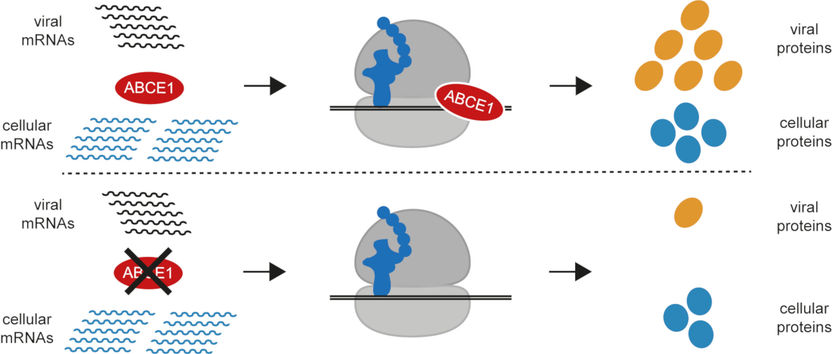Important host protein revealed for measles, mumps, and HRSV infections
Advertisement
One approach in developing new medicines to treat virus infections is to search for components of the host cell which viruses require to enter the cell and replicate. In an international research collaboration, scientists at the Paul-Ehrlich-Institut discovered that ABCE1, a member of the ABC transporter protein family, has a key role in the protein synthesis of all three viruses.

The protein ABCE1 is required for measles, mumps, and HRSV virus replication. When levels are too low, the viruses can no longer replicate efficiently.
PEI
There are very few treatment options available for virus infections. Researchers at the Paul-Ehrlich-Institut (PEI), directed by Professor Veronika von Messling who was head of Division of Veterinary Medicines until September 2018, together with scientists from the USA, Singapore, and Canada, searched for common targets against viruses in the Paramyxoviridae and Pneumoviridae families. These virus families include clinically significant viruses such as measles and mumps viruses (Paramyxoviridae), as well as human respiratory syncytial virus (HRSV) (Pneumoviridae), which causes serious respiratory infections in infants. The aim was to identify new approaches for the development of effective medicines to treat virus infections caused by these pathogens.
For their search, the research group used RNA interference. This mechanism causes so-called gene silencing, a mechanism in which double-stranded RNA molecules (siRNA) deactivate a specific gene by causing the degradation of the complementary messenger RNA (mRNA). As a result, the protein products of these genes are no longer produced because the mRNA of these genes is no longer available. Professor von Messling’s research team performed such screens for measles, mumps, or HRSV viruses separately. Towards this, the replication of the respective virus was tested in cells where individual genes had been deactivated by prior introduction of a complementary siRNA. By observing a reduction in virus replication, the respective deactivated target gene was identified as important for virus replication. The results of the screens for the individual viruses were then compared to identify the target genes that belong to those cellular processes and signaling pathways used by all three viruses. ABCE1, a member of the ABC transporter family of proteins which have an ATP-binding cassette, emerged as a top candidate protein. In further experiments, the researchers demonstrated that ABCE1 is in fact essential for the replication of all three viruses.
"Our research provides an overview of the cellular proteins and signaling pathways connected with infections by measles, mumps, and HRSV viruses, and also shows for the first time that ABCE1 is required by these viruses as a host factor. This could be an important starting point for the development of effective broad-spectrum antiviral medicines," stated Professor von Messling in explaining the significance of these findings.
Original publication
Anderson DE, Pfeffermann K, Kim SY, Sawatsky B, Pearson J, Kovtun M, Corcoran DL, Krebs Y, Sigmundsson K, Jamison SF, Yeo ZZJ, Rennick LJ, Wang LF, Talbot PJ, Duprex WP, Garcia-Blanco MA, von Messling V (2019): "Comparative loss of function screens reveal ABCE1 as an essential cellular 1 host factor for efficient translation of Paramyxoviridae and Pneumoviridae"; mBio May 14 [Epub ahead of print].





















































